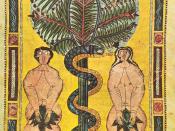Prometheus, the creator of mankind, and the snake in Genesis both purposely and wrongfully want to give the human race knowledge and wisdom. In the next paragraphs, I will discuss the characters qualities, how and why they decide to provide this knowledge, and, finally, both the positive and the negative consequences of doing so.
When seen in context, Prometheus and the snake have very similar qualities. They are both extremely knowledgeable and wiser than the rest of mankind. Prometheus is known for being wiser than the other Gods such as Atlas. Therefore, he is closer to being compared to the father of all Gods, Zeus. The snake also has these god-like attributes because he knows more than Adam and Eve, who are really nothing more than ignorant and blissful children who are in the arms of Jehovah, who is the father figure in this story. Yet again, he might be compared to God, but he is not as powerful.
Prometheus is also not as powerful as Zeus, which is why in the end; both characters are punished for their knowledge and their actions.
Prometheus and the snake both want to give knowledge to mankind because they don't want humans to be ignorant subordinates to the Gods (or God). The snake, in Genesis, clearly tells Eve, "...then your eyes shall be opened, and ye shall be as gods, knowing good and evil." (Genesis p.19) This shows that, for the snake, it is important for human beings to be allowed to think for themselves and to know the difference between what is right and what is wrong, and to be able to make a choice. The knowledge of good and evil is seen as independence, as an independence from the chains that attach us to God and his words,


